Related Research Articles
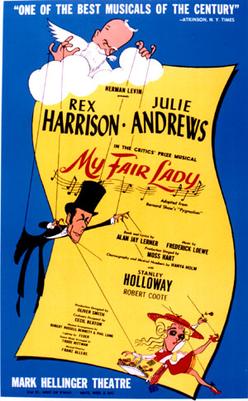
My Fair Lady is a musical based on George Bernard Shaw's 1913 play Pygmalion, with a book and lyrics by Alan Jay Lerner and music by Frederick Loewe. The story concerns Eliza Doolittle, a Cockney flower girl who takes speech lessons from professor Henry Higgins, a phonetician, so that she may pass as a lady. Despite his cynical nature and difficulty understanding women, Higgins grows attached to her.

Katharine Houghton Hepburn was an American actress in film, stage, and television. Her career as a Hollywood leading lady spanned over 60 years. She was known for her headstrong independence, spirited personality, and outspokenness, cultivating a screen persona that matched this public image, and regularly playing strong-willed, sophisticated women. Her work was in a range of genres, from screwball comedy to literary drama, and earned her various accolades, including four Academy Awards for Best Actress—a record for any performer. In 1999, Hepburn was named the greatest female star of classic Hollywood cinema by the American Film Institute.

Spencer Bonaventure Tracy was an American actor. He was known for his natural performing style and versatility. One of the major stars of Hollywood's Golden Age, Tracy was the first actor to win two consecutive Academy Awards for Best Actor from nine nominations. During his career, he appeared in 75 films and developed a reputation among his peers as one of the screen's greatest actors. In 1999, the American Film Institute ranked Tracy as the 9th greatest male star of Classic Hollywood Cinema.
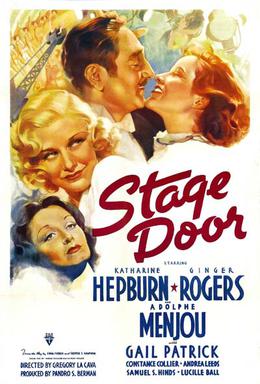
Stage Door is a 1937 RKO film directed by Gregory La Cava. Adapted from the play of the same name, it tells the story of several would-be actresses who live together in a boarding house at 158 West 58th Street in New York City. The film stars Katharine Hepburn, Ginger Rogers, Adolphe Menjou, Gail Patrick, Constance Collier, Andrea Leeds, Samuel S. Hinds and Lucille Ball. Eve Arden and Ann Miller, who became notable in later films, play minor characters.
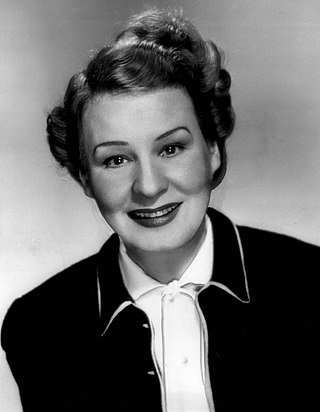
Shirley Booth was an American actress. One of only 24 performers to achieve the Triple Crown of Acting, Booth was the recipient of an Academy Award, two Primetime Emmy Awards and three Tony Awards.

Keir Atwood Dullea is an American actor. He played astronaut David Bowman in the 1968 film 2001: A Space Odyssey and its 1984 sequel, 2010: The Year We Make Contact. His other film roles include David and Lisa (1962), Bunny Lake Is Missing (1965) and Black Christmas (1974). Dullea studied acting at the Neighborhood Playhouse School of the Theatre in New York City. He has also performed on stage in New York City and in regional theaters; he has said that, despite being more recognized for his film work, he prefers the stage.

42nd Street is a 1980 stage musical with a book by Michael Stewart and Mark Bramble, lyrics by Al Dubin and Johnny Mercer and music by Harry Warren. The 1980 Broadway production won the Tony Awards for Best Musical and Best Choreography and it became a long-running hit. The show was also produced in London in 1984 and its 2001 Broadway revival won the Tony Award for Best Revival.
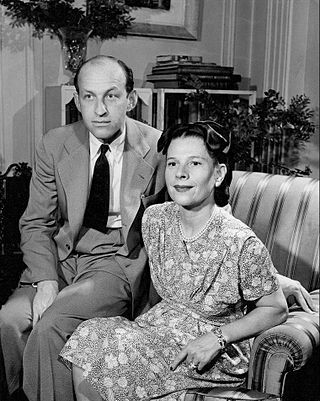
Garson Kanin was an American writer and director of plays and films.

Katharine Cornell was an American stage actress, writer, theater owner and producer. She was born in Berlin to American parents and raised in Buffalo, New York.

William Brian de Lacy Aherne was an English actor of stage, screen, radio and television, who enjoyed a long and varied career in Britain and the United States.
Tea at Five is a 2002 one-woman play, written by Matthew Lombardo, which tells the story of Katharine Hepburn in a monologue. It is based on Hepburn's book Me: Stories of My Life. The play starred Kate Mulgrew, and was apparently written with her in mind for the part.
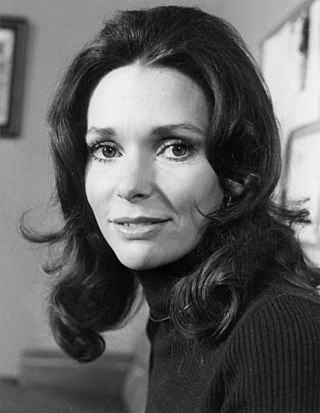
Susan Elizabeth Strasberg was an American stage, film, and television actress. Thought to be the next Hepburn-type ingenue, she was nominated for a Tony Award at age 18, playing the title role in The Diary of Anne Frank. She appeared on the covers of LIFE and Newsweek in 1955. A close friend of Marilyn Monroe and Richard Burton, she wrote two best-selling tell-all books. Her later career primarily consisted of slasher and horror films, followed by TV roles, by the 1980s.
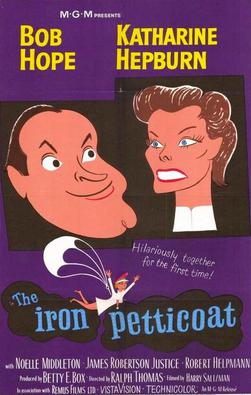
The Iron Petticoat is a 1956 British Cold War comedy film starring Bob Hope and Katharine Hepburn, and directed by Ralph Thomas. The screenplay by Ben Hecht became the focus of a contentious history behind the production, and led to the film's eventual suppression by Hope. Hecht had been part of the screenwriting team on the similarly themed Comrade X (1940).

The West Side Waltz is a play by Ernest Thompson.
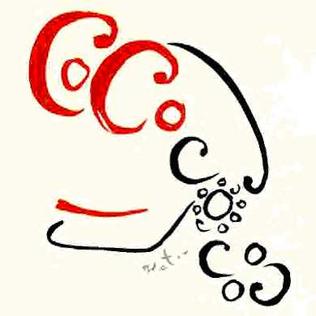
Coco was a 1969 Broadway musical with a book and lyrics by Alan Jay Lerner and music by André Previn, inspired by the life of Coco Chanel. It starred Katharine Hepburn in her only stage musical.

Jed Harris was an Austrian-born American theatrical producer and director. His many successful Broadway productions in the 1920s and 1930s include Broadway (1926), Coquette (1927), The Royal Family (1927), The Front Page (1928), Uncle Vanya (1930), The Green Bay Tree (1933) and Our Town (1938). He later directed the original Broadway productions of The Heiress (1947) and The Crucible (1953).

Lowell J. Sherman was an American actor and film director. In an unusual practice for the time, he served as both actor and director on several films in the early 1930s. He later turned exclusively to directing. Having scored huge successes directing the films She Done Him Wrong and Morning Glory, he was at the height of his career when he died after a brief illness.
Esme Church was a British actress and theatre director. In a long career she acted with the Old Vic Company, the Royal Shakespeare Company and on Broadway. She directed plays for the Old Vic, became head of the Old Vic Theatre School and then director of the Bradford Civic Playhouse, with its associated Northern Theatre School.
Stage Door is a 1936 stage play by Edna Ferber and George S. Kaufman about a group of struggling actresses who room at the Footlights Club, a fictitious theatrical boardinghouse in New York City modeled after the real-life Rehearsal Club. The three-act comedy opened on Broadway on October 22, 1936, at the Music Box Theatre and ran for 169 performances. The play was adapted into the 1937 film of the same name, and was also adapted for television.

Dorothy Massingham was a British actress and playwright.
References
- ↑ 'The Lake: Fine Acting at the Arts', The Stage 9 March 1933, p. 9.
- ↑ https://theatricalia.com/play/36n/the-lake/production/110w
- ↑ 'Obituary: Miss Dorothy Massingham', The Stage 6 April 1933, p. 15
- ↑ "Cinema: The Hepburn Story". Time. September 1, 1952. Archived from the original on January 13, 2005. Retrieved August 21, 2011.
- ↑ Berg, Scott (2004). Kate Remembered: A Personal Biography of Katharine Hepburn , p. 93.
- ↑ Berg (2004), p. 91.
- ↑ Hepburn, Katharine (1991). Me: Stories of my Life, p. 4.
- ↑ Berg (2004), p. 116.